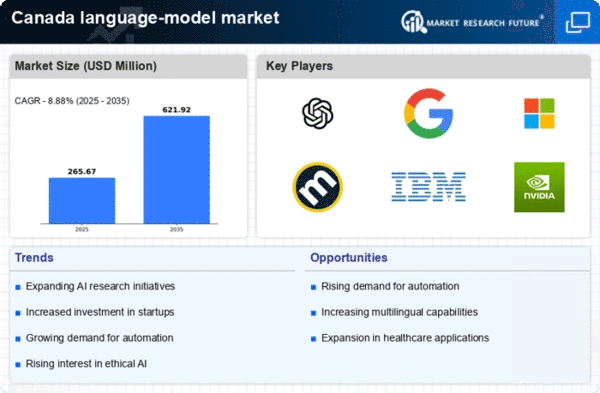Rising Demand for Automation
The large language-model market in Canada is experiencing a notable surge in demand for automation across various sectors. Businesses are increasingly recognizing the potential of language models to streamline operations, enhance productivity, and reduce costs. For instance, the integration of these models in customer service has shown to improve response times by up to 30%. This trend is particularly evident in industries such as finance and healthcare, where efficiency is paramount. As organizations seek to leverage technology for competitive advantage, the large language-model market is expected to expand significantly, with projections indicating a growth rate of approximately 25% annually over the next five years. This rising demand for automation is a key driver, as companies aim to optimize their workflows and improve service delivery.
Enhanced Data Availability and Quality
Enhanced data availability and quality is a pivotal driver for the large language-model market in Canada. The proliferation of digital data across various sectors provides a rich resource for training language models, improving their accuracy and effectiveness. As organizations increasingly recognize the value of high-quality data, investments in data collection and management are on the rise. This trend is particularly relevant in industries such as retail and healthcare, where data-driven insights can lead to better decision-making. The availability of diverse datasets enables the development of more robust language models, which in turn drives their adoption across different applications. Consequently, the large language-model market is likely to benefit from this enhanced data landscape, with projections indicating a potential growth of 30% in model performance due to improved data quality.
Regulatory Support for AI Technologies
Regulatory support for artificial intelligence technologies is emerging as a significant driver for the large language-model market in Canada. The Canadian government is actively promoting the responsible use of AI through policies and frameworks that encourage innovation while ensuring ethical standards. This supportive regulatory environment is likely to foster growth in the large language-model market, as companies feel more secure in their investments. For instance, initiatives aimed at simplifying compliance processes and providing funding for AI projects are expected to enhance market dynamics. As businesses navigate the regulatory landscape, the presence of supportive policies may lead to increased adoption of language models, further propelling market expansion. The alignment of regulatory frameworks with industry needs is crucial for the sustainable growth of the large language-model market.
Investment in AI Research and Development
Investment in artificial intelligence research and development is a critical driver for the large language-model market in Canada. Government initiatives and private sector funding are increasingly directed towards advancing AI technologies. In 2025, Canadian investments in AI are projected to reach $1.5 billion, reflecting a commitment to fostering innovation. This influx of capital supports the development of more sophisticated language models, enhancing their capabilities and applications. Furthermore, partnerships between tech companies and research institutions are becoming more prevalent, facilitating knowledge transfer and accelerating advancements in the field. As a result, the large language-model market is set for growth, driven by a robust ecosystem of research and development that fuels innovation and application.
Growing Need for Multilingual Capabilities
The large language-model market in Canada is significantly influenced by the growing need for multilingual capabilities. With a diverse population and a multicultural landscape, businesses are increasingly seeking language models that can understand and generate content in multiple languages. This demand is particularly pronounced in sectors such as education, tourism, and e-commerce, where effective communication is essential. The ability to cater to various linguistic groups not only enhances customer engagement but also expands market reach. As a result, companies are investing in language models that can support multiple languages, thereby driving growth in the large language-model market. Estimates suggest that the demand for multilingual models could increase by 40% over the next few years, highlighting the importance of this driver in shaping the market landscape.
















